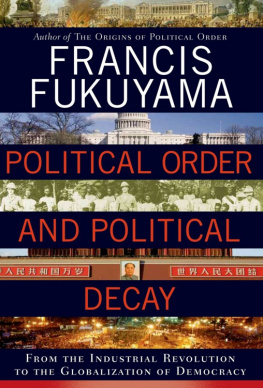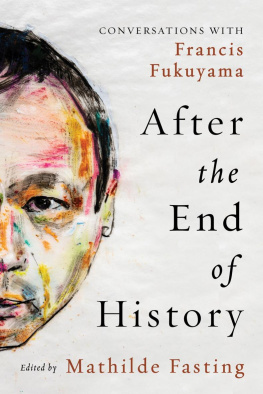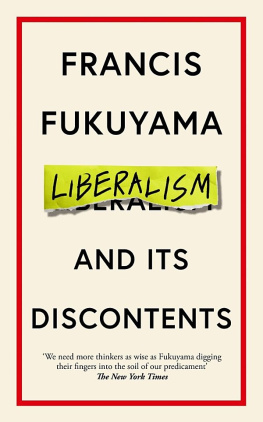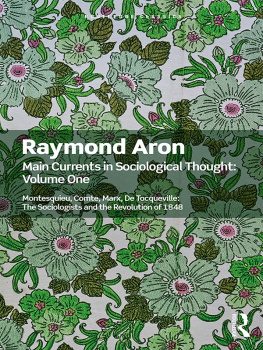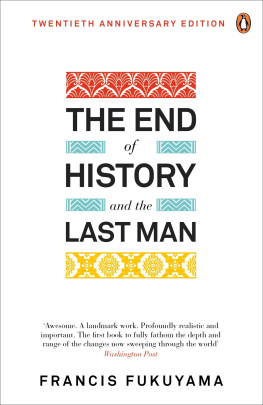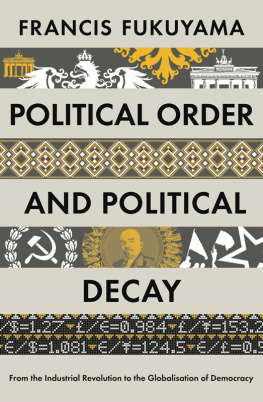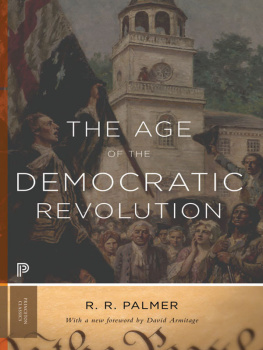About the Author
Francis Fukuyama is the Olivier Nomellini Senior Fellow at Stanford Universitys Freeman Spogli Institute for International Studies. He has previously taught at the Paul H. Nitze School of Advanced International Studies of the Johns Hopkins University and at the George Mason University School of Public Policy. Fukuyama was a researcher at the RAND Corporation and served on the State Departments Policy Planning Staff. He is the author of The Origins of Political Order , The End of History and the Last Man , Trust , and America at the Crossroads . He lives with his wife in California.
ACKNOWLEDGMENTS
Im very grateful to a number of people and institutions that have helped me in the preparation of this volume, as well as its predecessor. I have found a wonderful institutional home at the Center for Democracy, Development, and the Rule of Law (CDDRL) at Stanfords Freeman Spogli Institute for International Studies, under the leadership of CDDRLs director, Larry Diamond. There are many people who read parts or all of the manuscript and provided comments as well as valuable insights into the many issues covered. My wife, Laura Holmgren, read the manuscript early on and has been completely supportive over the years it has taken to write this book, as well as in all of the ones preceding.
I would like to pay special thanks to David Abernethy, the late Joel Barkan, Margaret Boittin, Bruce Cain, Gerhard Casper, Roberto DAlimonte, Tino Cullar, Larry Diamond, Giovanna Dore, Peter Duns, Karl Eikenberry, Don Emmerson, Morris Fiorina, Adam Garfinkle, Elira Karaja, Eric Kramon, Steven Krasner, Melissa Lee, Peter Lewis, Reo Matsuzaki, Ian Morris, Paul Ockelmann, Dan Okimoto, Elena Panaritis, Minxin Pei, Marc Plattner, Alastair Roberts, Richard Roberts, Eric E. Schmidt, Jim Sheehan, Landry Sign, Peter Skerry, Melissa Thomas, Lucan Way, Daniel Ziblatt, and research assistants Jason Wu, Purun Cheong, Priscilla Choi, Kamil Dada, Nicholas Dugdale, Alana Kirkland, and Devanshi Patel. Samantha Maskey and Lauren Weitzman both helped on research and on the production of the book as a whole. Parts of this book were presented at the Berkeley Global History Seminar, the University of Puget Sound, the Belfer Center at Harvards Kennedy School, the Center for Global Development, and the Europe Center and CDDRL at Stanford; Im appreciative of the comments received.
I am extremely grateful to my editor at Farrar, Straus and Giroux, Eric Chinski, who (as in the case of Volume 1) provided invaluable guidance and judgment on how to refine and present my arguments. I would also like to extend special thanks to Andrew Franklin of Profile Books, Paulo Rocco at Editora Rocco, and Mizzi van der Pluijm at Contact, who over the years have published every single book Ive written. In addition, Cynthia Merman did a heroic job copyediting and fact-checking the manuscript. This book would not be possible without my terrific literary agents, Esther Newberg, Sophie Baker, and Betsy Robbins.
ALSO BY FRANCIS FUKUYAMA
The Origins of Political Order: From Prehuman Times to the French Revolution
America at the Crossroads: Democracy, Power, and the Neoconservative Legacy
State-Building: Governance and World Order in the Twenty-first Century
Our Posthuman Future: Consequences of the Biotechnology Revolution
The Great Disruption: Human Nature and the Reconstitution of Social Order
Trust: The Social Virtues and the Creation of Prosperity
The End of History and the Last Man
BIBLIOGRAPHY
Abdullah, Taufik. 2009. Indonesia: Towards Democracy . Singapore: ISEAS.
Abernethy, David B. 2000. The Dynamics of Global Dominance: European Overseas Empires, 14151980 . New Haven: Yale University Press.
Acemoglu, Daron, Simon Johnson, and James A. Robinson. 2001. The Colonial Origins of Comparative Development: An Empirical Investigation. American Economic Review 91(5):13691401.
______ . 2002. Reversal of Fortune: Geography and Institutions in the Making of the Modern World Income Distribution. Quarterly Journal of Economics 107:123194.
Acemoglu, Daron, and James A. Robinson. 2005. Economic Origins of Dictatorship and Democracy. New York: Cambridge University Press.
______ . 2012. Why Nations Fail: The Origins of Power, Prosperity and Poverty . New York: Crown.
Admati, Anat, and Martin Hellwig. 2013. The Bankers New Clothes: Whats Wrong with Banking and What to Do About It . Princeton: Princeton University Press.
Akita, George. 1967. Foundations of Constitutional Government in Modern Japan, 18681900 . Cambridge, MA: Harvard University Press.
Allum, P. A. 1973. ItalyRepublic Without Government? New York: Norton.
______ . 1973. Politics and Society in Post-War Naples . Cambridge: Cambridge University Press.
Almond, Gabriel A., et al. 2004. Comparative Politics: A Theoretical Framework . 5th ed. New York: Pearson/Longman.
Amsden, Alice H. 1989. Asias Next Giant: South Korea and Late Industrialization . New York: Oxford University Press.
Anderson, Benedict. 1991. Imagined Communities: Reflections on the Origins and Spread of Nationalism. New York: Verso.
Ang, Yuen Yuen. 2012. Bureaucratic Incentives, Local Development, and Petty Rents. Paper presented at the Conference on the Quality of Governance. Stanford University.
Anson, Jos, Oliver Cadot, and Marcelo Olarreaga. 2003. Import Tariff Evasion and Customs Corruption: Does Pre-Shipment Inspection Help? Washington, D.C.: World Bank.
Auyero, Javier. 2000. The Logic of Clientelism in Argentina: An Ethnographic Account. Latin American Research Review 35(3):5581.
Ayittey, George B. N. 2006. Indigenous African Institutions . 2nd ed. Ardsley-on-Hudson, NY: Transactional Publishers.
Bagehot, Walter. 2001. The English Constitution . New York: Oxford University Press.
Balogh, Brian. 2002. Scientific Forestry and the Roots of the Modern American State: Gifford Pinchots Path to Progressive Reform. Environmental History 7(2):198225.
Banerjee, Abhijit, and Lakshmi Iyer. 2005. History, Institutions, and Economic Performance: The Legacy of Colonial Land Tenure Systems in India. American Economic Review 95(4):11901213.
Banfield, Edward C. 1958. The Moral Basis of a Backward Society . Glencoe, IL: Free Press.
______ , and James Q. Wilson. 1963. City Politics . Cambridge, MA: Harvard University Press.
Barber, Michael. 2008. Instruction to Deliver: Fighting to Transform Britains Public Services . London: Methuen.
Barkan, Joel D., ed. 1994. Beyond Capitalism vs. Socialism in Kenya and Tanzania . Boulder, CO: Lynne Rienner.
Barro, Robert J. 1997. Determinants of Economic Growth: A Cross-Country Survey . Cambridge, MA: MIT Press.
______ . 1999. Determinants of Democracy. Journal of Political Economy 107: 15883.
Bates, Robert. 2005. Markets and States in Tropical Africa: The Political Basis of Agricultural Policies . Berkeley: University of California Press.
Baumgartner, Frank R., and Beth L. Leech. 1998. Basic Interests: The Importance of Groups in Politics and in Political Science . Princeton: Princeton University Press.
Baumgartner, Frank R., et al. 2009. Lobbying and Policy Change: Who Wins, Who Loses, and Why . Chicago: University of Chicago Press.
Beer, Lawrence W., and John M. Maki. 2002. From Imperial Myth to Democracy: Japans Two Constitutions, 18892002 . Boulder: University Press of Colorado.
Bell, Daniel. 1973. The Coming of Post-Industrial Society: A Venture in Social Forecasting . New York: Basic Books.
Berman, Sheri. 2013. The Promise of the Arab Spring: In Political Development, No Gain Without Pain. Foreign Affairs 92(1):6474.
Bernhardt, Kathryn, and Philip C. C. Huang, eds. 1994. Civil Law in Qing and Republican China . Stanford, CA: Stanford University Press.
Berry, Sara. 1993. No Condition Is Permanent: The Social Dynamics of Agrarian Change in Sub-Saharan Africa . Madison: University of Wisconsin Press.
Next page
